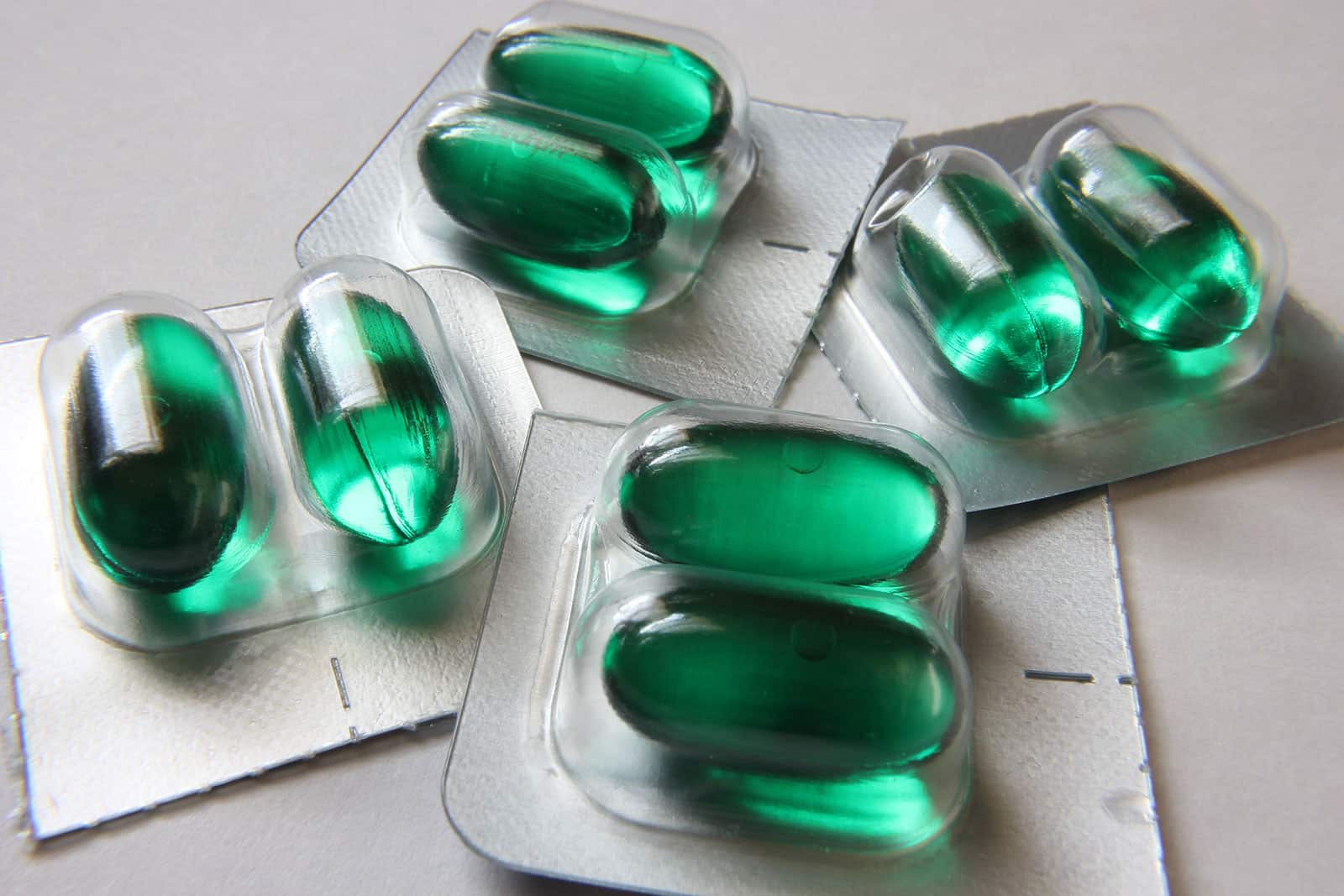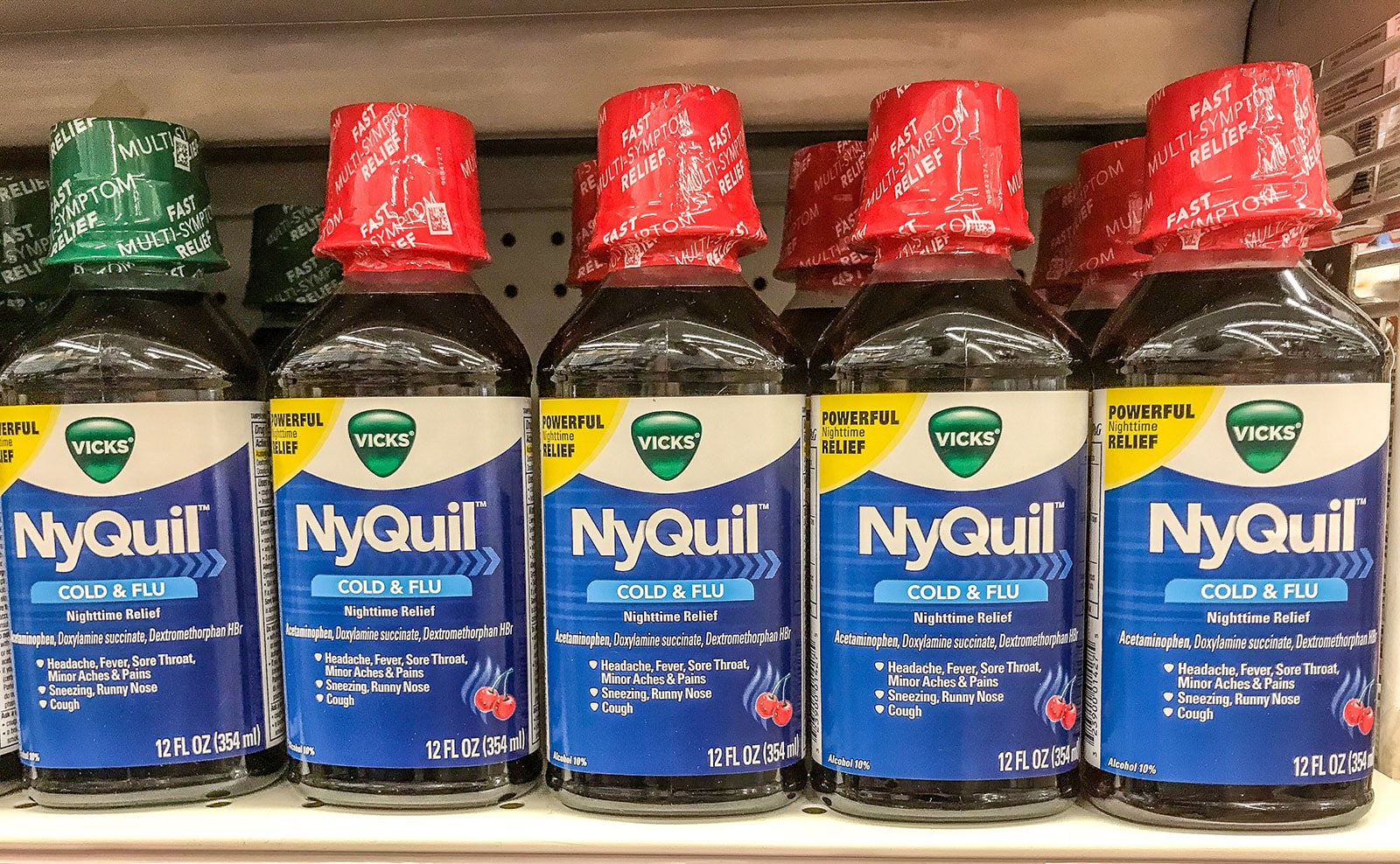[
When people have sniffles, coughs, aches, fevers, and a runny nose, they often turn to an over-the-counter cold and cough medicine like NyQuil. And while the ingredients in NyQuil can help alleviate many common cold and flu symptoms, NyQuil may have addictive potential. This article explores the ingredients in NyQuil and why the medication can easily be misused or abused.
What Is NyQuil?
NyQuil is an (OTC drug) over-the-counter medication that people commonly use to help alleviate their cold or flu symptoms. NyQuil contains four active ingredients:
- Acetaminophen: Acetaminophen is designed to reduce fevers and relieve pain, such as sore throats and headaches.
- Dextromethorphan: This dissociative anesthetic chemical with mind-altering effects acts as a cough suppressant. It was previously considered a synthetic opioid due to the similarity between its and codeine’s structures.
- Doxylamine succinate: This ingredient is an antihistamine, which helps to relieve runny noses, sneezing, and itchy eyes. It also has sedative effects.
- Phenylephrine HCl: This ingredient is designed to be a decongestant and can help with sinus congestion and runny noses.
The above ingredients work together to relieve cold and flu symptoms, such as fever, congestion, mild body aches, and coughs. NyQuil is available as a liquid, LiquiCaps, or VapoCool caplets.
Understanding Addiction
Addiction is a complex medical condition characterized by a compulsive need to consume a substance or perform an activity. Substances can include alcohol, drugs, medication, food, and cigarettes, while activities can include gambling, sex, video games, and more. People who are addicted to a substance or activity have no control over when to stop. This eventually leads to negative impacts on their physical and mental health, as well as their social lives.
Many people associate substance abuse with drugs and alcohol. However, addiction can occur with prescription and over-the-counter medications. Long-term or excessive use of medications can create a chemical dependence. Some medications produce feelings of euphoria or are sedatives. This can lead to a psychological dependence. In addition, many over-the-counter drugs can be taken unsupervised, making it easy for people to increase their dosage.
Different Levels of Addiction
Besides the different types of addiction, there are different levels, too. Physical dependence occurs when your body adapts to the presence of a substance, such as drugs or alcohol. Once you stop taking the substance, your body goes through withdrawal symptoms.
Psychological addiction involves an emotional or mental reliance on a drug. The body can go without the substance, but the mind enjoys the pleasurable feelings the substance provides.
Finally, tolerance means the body needs higher doses for the medication or drug to have the same effect. By increasing the dosage amount, individuals can quickly develop an addiction.
Ingredients in NyQuil and Their Effects
The ingredients in NyQuil work together to relieve pain, suppress coughs, and reduce fevers. This is all dependent on taking the recommended dosage, however. Expected side effects of NyQuil include dizziness and dry mouth, whereas excessive use can result in side effects such as liver damage.
What constitutes excessive use? One tablespoon of NyQuil is 325 milligrams of acetaminophen. The standard dosage is two tablespoons, which is 650 milligrams. Severe liver damage can occur if you take 4 grams of acetaminophen in 24 hours.
In addition to the damage to your liver associated with taking NyQuil in excess, there are the addictive properties of the ingredients. Doxylamine is an antihistamine, but it also makes you sleepy. Many people may develop a psychological addiction to NyQuil, using it as a mild sleeping aid daily. Cough medicine containing Dextromethorphan is also used to create “Lean.” Lean is a drug concoction that mixes cough syrup and a soft drink and creates a slight euphoric effect.
Potential for Misuse and Abuse
There is the potential to misuse and abuse NyQuil as a sleeping aid since one of its key ingredients has sedative effects. People may take it nightly if they are suffering from insomnia or they need a sedative to cope with anxiety or stress. They may start with the recommended dose, but after developing a tolerance, they may increase the daily dosage to feel the same sedative effects.
Others may choose to combine NyQuil with alcohol, marijuana, or pills to intensify its sedative characteristics. Like with the Lean drug, dextromethorphan can easily be misused. Robotripping on dextromethorphan or DXM creates a euphoric effect. There are different levels of robotripping, also known as plateaus.
- 1st Plateau: 100 – 200 mg of DXM – creates feelings of euphoria
- 2nd Plateau: 200 – 400 mg of DXM – creates feelings similar to alcohol intoxication
- 3rd Plateau: 400 – 600 mg of DXM – creates feelings similar to taking ketamine
- 4th Plateau: 500 – 1,500 mg of DXM – creates feelings similar to taking PCP
Risks of Long-Term Use
As mentioned above, long-term use of NyQuil can bring about liver damage. NyQuil shouldn’t be used for two weeks straight, and continued use can lead to severe health consequences.
Continued use can also lead to reduced alertness, drowsiness, and blurred vision. This can affect daily activities. Tolerance is an issue as well. With long-term use, your body may develop cravings followed by a tolerance and you may need to take large doses to feel the same sedative effects.
Because NyQuil has a sedative effect, stopping suddenly may affect your sleep patterns, leading to insomnia and irritability. Some people may need professional help, such as detox, in an addiction treatment center to avoid NyQuil withdrawal symptoms when they stop using the drug.
The ingredients in NyQuil may also interact with other medications, either reducing their efficacy or creating adverse effects.
The decongestant Phenylephrine HCl can also cause health problems, such as high blood pressure. Some studies have shown an increase in blood pressure with doses over 15mg. In each 30mL dose of NyQuil, there is 10mg of Phenylephrine HCl.

NyQuil Vs. Prescription Sleep Aids
While NyQuil may seem innocuous when you’re treating it for your cold or flu, remember that it does have a sedative effect. How does this compare to prescription sleep aids?
Prescription sleep aids are medications designed to help with insomnia. The active ingredient in many non-prescription and prescription sleeping aids is Diphenhydramine (Benadryl). Diphenhydramine (like Doxylamine succinate – the ingredient in NyQuil) is an antihistamine, and the longer you take antihistamines, the less likely they are to make you sleepy unless you increase the dosage. Antihistamines block specific chemicals in your brain, helping you relax. This action also makes you feel sedated.
The most common sleep aids have the following ingredients:
- Diphenhydramine
- Doxylamine
- Melatonin Receptor Agonists (mimic the hormone melatonin)
- Valerian
Note that Doxylamine is found in both sleep aids and NyQuil. Many people believe that NyQuil is a safer option when used as a sleeping aid. However, the fact that it contains the same ingredient (Doxylamine) as other prescription sleep aids means it’s potentially just as addictive. Furthermore, Doxylamine stays in your body longer than Diphenhydramine, which can result in next-day drowsiness.
Managing Safe Use
Because NyQuil has a potential for misuse and abuse, it’s important to read the label carefully. Be mindful of any precautions and warnings (such as not taking the medication if you are pregnant or breastfeeding).
Furthermore, make sure to follow the dosage instructions as not all NyQuil medications are created equally – NyQuil comes in different strengths, such as NyQuil Severe Cold & Flu, NyQuil Cough DM+, and more. Avoid mixing NyQuil with other cold medicines you may be taking. If you are taking medications for chronic conditions, such as high blood pressure or cholesterol medication, you may want to check with your doctor first. Some medications may have an adverse effect on each other.
NyQuil is a short-term treatment option; it isn’t recommended for more than two weeks, so if you have persistent cold and flu symptoms after 14 days, stop taking any over-the-counter medications and see a doctor.
You should see a doctor if you or your loved one have the following cold and flu symptoms:
• Fever above 101 degrees Fahrenheit
• Persistent headache that won’t go away
• Chest pain
• Difficulty breathing
• Persistent diarrhea or vomiting
• Fatigue that doesn’t improve
• New symptoms
Alternatives to NyQuil
Because NyQuil has ingredients that have addictive potential, it may be worth considering alternative remedies.
If you have a cold or flu, take vitamin C supplements or add more vitamin C to your daily diet, such as oranges. Another way to boost your immune system when you’re feeling sick is to take Echinacea. Echinacea is a herb that attacks fungi and boosts immune function.
You can also drink a mixture of honey and lemon. This may soothe your sore throat and help alleviate coughs. Combine this with hot herbal teas, such as ginger or peppermint teas.
Rest is a great healer for the body as it allows the body to recover. Drink plenty of water and stay in bed for as long as you can. Staying hydrated and getting a lot of sleep can do wonders for the body.
If your throat feels particularly sore, gargle with warm saltwater. This reduces irritation and may help soothe your throat. For meals, think of warm chicken soup and bone broth. Both can help you recover faster as they’re high in minerals and proteins.
Conclusion
If you’re thinking about buying NyQuil the next time you have a cold or the flu, think about its addictive potential and possible side effects on behavioral health. Although it won’t cause you any harm if you take the recommended dosage and follow the instructions on the label, it’s important to be aware of its ingredients and the resulting health issues in high doses.
Self-medication can lead to abuse, which can develop into an addiction. If you or your loved one is addicted to drugs or over-the-counter medications, contact Live Free Recovery Services. Our rehab center offers various inpatient and outpatient treatment options for different types of addiction, including prescription drug addiction. Call today to find out how we can help.
References
1] https://www.healthline.com/health/does-nyquil-make-you-sleepy
2] https://health.ucsd.edu/care/liver-disease/drug-induced-liver-injury/
3] https://www.ucihealth.org/blog/2018/03/acetaminophen-liver-failure
4] https://www.healthline.com/health/robotripping#plateaus
5] https://pmc.ncbi.nlm.nih.gov/articles/PMC4500855/
6] https://www.goodrx.com/conditions/insomnia/doxylamine-vs-diphenhydramine
7] https://www.healthline.com/health/types-of-addiction
8] https://www.healthline.com/health/healthy-sleep/antihistamine-for-sleep


